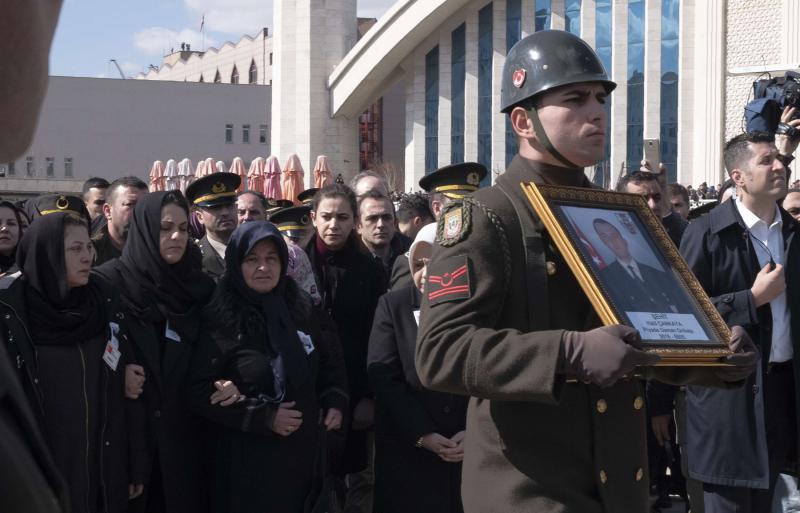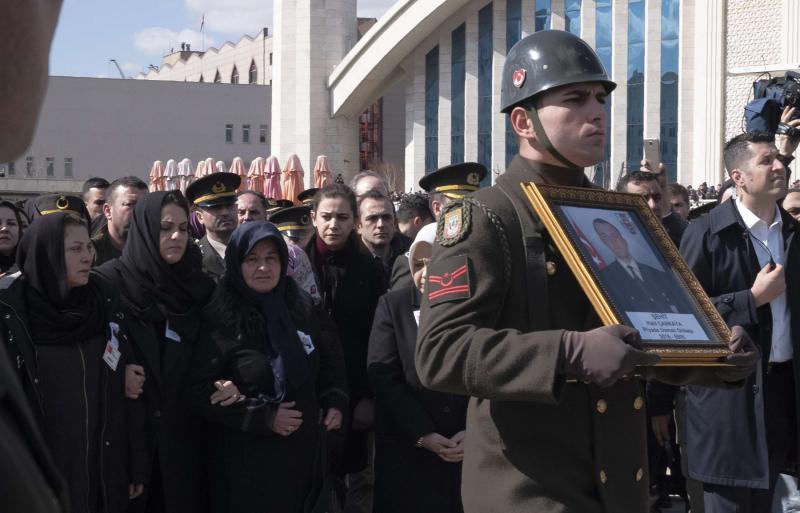Erdogan's invocation of Ottoman history fools no one
Turkish President Recep Tayyip Erdogan likened the Greeks to the Nazis for the violence the Greeks practised against migrants who crossed from Turkey seeking asylum. Some Jews of Athens pointed out that the modern-day sultan was merely attempting to mislead Western public opinion by hiding the truth that he was trading with human lives for political gain.
The response was sufficient to expose Erdogan’s blackmailing of Europe. Nothing, however, seems sufficient to stop the Turkish president from frequently summoning up history to justify his foreign policy debacles and his intervention in neighbouring countries and the rest of the region.
Before bringing up German Nazism to qualify the violence used by Greece to repel the waves of illegal migrants, Erdogan used the history of the Ottoman Empire to find justifications for his invasions of Libya and Syria. The new sultan dug into what he saw as the golden age of his ancestors who had occupied the Arab region for hundreds of years, hoping to find the rare gems that would persuade the Turks that his military adventures abroad aim to revive the past glory of their ancestors who ruled over an empire feared by all and that extended over countries in at least three continents.
With the first deaths of Turkish soldiers in Erdogan's wars in Libya and Syria, the illusions of past glories carefully constructed by the great magician came tumbling down. The Turks are not buying it anymore and demand that their sultan stops using this sham to justify his foreign military adventures and to refrain from shedding any more Turkish blood in causes that the Turks don’t believe in.
On the contrary, they yearn for greater openness and more integration with the world. Many still dream of joining the European Union. They’re looking for the freedom to travel and to seek employment opportunities. They’re dreaming of improving their country’s economy and of having the best relations with all countries in the East and the West.
By trying to revisit the Ottoman past, Erdogan not only failed to rally Turkish public opinion to support his foreign wars but he provided ammunition for the opposition. Many Turkish historians, researchers and politicians opposed to autocratic rule are calling on Erdogan to stop being selective in interpreting the history of the Ottoman Empire because the Ottoman era included many failures, massacres, defeats and betrayals that the Turks, before the rest of the world, see as a disgrace.
Erdogan’s story with history did not end there. His constant references to the glorious days of the Ottomans angered the peoples in many countries who resent Erdogan’s ambitions.
In many parts of the Arab world, Ottomans are perceived as occupiers rather than successors to a far-flung Islamic empire. Erdogan's opponents in European countries and the West took advantage of his Ottoman rhetoric to rally people against him.
One of the obvious results of the anti-Erdogan mobilisation was the recognition by the legislatures of many countries around the world of the Armenian massacre committed by the Ottomans during World War I. The latest to recognise the massacre of the Armenians was none other than the homeland of US President Donald Trump, who takes great pride in his friendship with Erdogan.
Erdogan’s abuse of the historical record to promote his wars and foreign adventures reflects political frustration and bankruptcy. It exposes his bet on a narrow group of supporters inside Turkey and followers in the Arab region.
In Turkey, Erdogan has rallied to his cause mainly his family, relatives and his cronies from the world of business who are betting on the success of the Erdoganian conquests to reap the spoils and establish economic colonies, money empires and investment portfolios. As for the Arab countries, it is only the converts to political Islam, headed by the Muslim Brotherhood, who sing the praises of the new Ottoman expansion.
In Erdogan's wars, the Turkish Army invaded Syria several times, with operations whose names and dates were chosen clearly referring to the Ottoman occupation of Syria.
With respect to Libya, the sultan stood before whatever was left of his supporters in the Justice and Development Party and recalled Ottoman leaders killed trying to occupy that African country.
It’s always the same story. Erdogan raises storms of enthusiasm in the hearts of his supporters by summoning the heroes of the Ottoman past but, when the storms subside and the coffins of the Turkish soldiers start arriving in Turkey, the real motives for the Erdogan's wars emerge.
Recently, Erdogan revealed that he offered Russian President Vladimir Putin the management of the Syrian oil fields in Deir ez-Zor. Soon after, a Turkish official announced an increase in the volume of Turkish investments in Libya to $120 billion. This is in addition to reports of Libya’s gold being smuggled to Turkey and about the balance of the Central Bank of Libya taking a one-way trip to Ankara.
The conclusion is that the Turkish occupation does not differ from the Ottoman occupation 500 years ago: It’s all about spoils and has no moral, legal, humanitarian or religious justification.
At the recent summit that brought together the Russian and Turkish presidents in Moscow to discuss the Idlib crisis in Syria, the Russians deliberately surrounded Erdogan with paintings, sculptures and works of art directly related to the shameful side of the Ottoman past so dear to the sultan. The Kremlin’s messages were clear and they’re backed by a sizeable body of evidence from history books pointing out that wherever the Ottomans passed, devastation followed. There is a lesson to be learnt here, for time does not repeat itself.
Baha al-Awam is a Syrian writer.
This article was originally published in The Arab Weekly.







